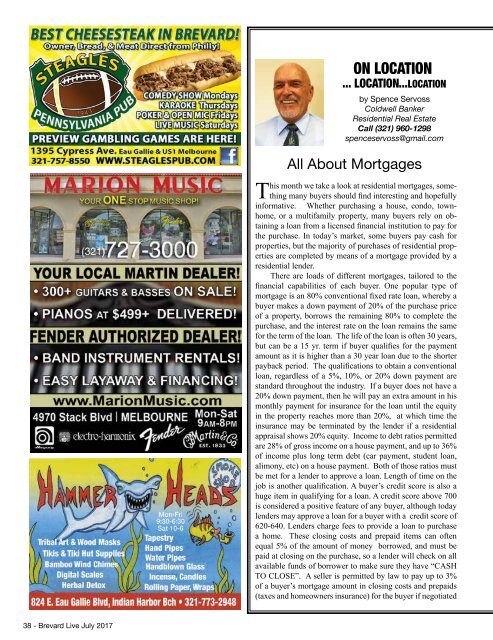Create successful ePaper yourself
Turn your PDF publications into a flip-book with our unique Google optimized e-Paper software.
ON LOCATION<br />
... LOCATION...LOCATION<br />
by Spence Servoss<br />
Coldwell Banker<br />
Residential Real Estate<br />
Call (321) 960-1298<br />
spenceservoss@gmail.com<br />
All About Mortgages<br />
This month we take a look at residential mortgages, something<br />
many buyers should find interesting and hopefully<br />
informative. Whether purchasing a house, condo, townhome,<br />
or a multifamily property, many buyers rely on obtaining<br />
a loan from a licensed financial institution to pay for<br />
the purchase. In today’s market, some buyers pay cash for<br />
properties, but the majority of purchases of residential properties<br />
are completed by means of a mortgage provided by a<br />
residential lender.<br />
There are loads of different mortgages, tailored to the<br />
financial capabilities of each buyer. One popular type of<br />
mortgage is an 80% conventional fixed rate loan, whereby a<br />
buyer makes a down payment of 20% of the purchase price<br />
of a property, borrows the remaining 80% to complete the<br />
purchase, and the interest rate on the loan remains the same<br />
for the term of the loan. The life of the loan is often 30 years,<br />
but can be a 15 yr. term if buyer qualifies for the payment<br />
amount as it is higher than a 30 year loan due to the shorter<br />
payback period. The qualifications to obtain a conventional<br />
loan, regardless of a 5%, 10%, or 20% down payment are<br />
standard throughout the industry. If a buyer does not have a<br />
20% down payment, then he will pay an extra amount in his<br />
monthly payment for insurance for the loan until the equity<br />
in the property reaches more than 20%, at which time the<br />
insurance may be terminated by the lender if a residential<br />
appraisal shows 20% equity. Income to debt ratios permitted<br />
are 28% of gross income on a house payment, and up to 36%<br />
of income plus long term debt (car payment, student loan,<br />
alimony, etc) on a house payment. Both of those ratios must<br />
be met for a lender to approve a loan. Length of time on the<br />
job is another qualification. A buyer’s credit score is also a<br />
huge item in qualifying for a loan. A credit score above 700<br />
is considered a positive feature of any buyer, although today<br />
lenders may approve a loan for a buyer with a credit score of<br />
620-640. Lenders charge fees to provide a loan to purchase<br />
a home. These closing costs and prepaid items can often<br />
equal 5% of the amount of money borrowed, and must be<br />
paid at closing on the purchase, so a lender will check on all<br />
available funds of borrower to make sure they have “CASH<br />
TO CLOSE”. A seller is permitted by law to pay up to 3%<br />
of a buyer’s mortgage amount in closing costs and prepaids<br />
(taxes and homeowners insurance) for the buyer if negotiated<br />
38 - Brevard Live July 2017


















